
views
Sticking to a Fast Safely

Consult your doctor, especially if you have any medical issues. Talk to a doctor to make sure fasting won’t adversely affect your health. Undergoing a fast can take a dangerous toll on your body if you have a history of medical issues. Additionally, pregnant people, children, and the elderly should avoid fasting. If you’re concerned about fasting for spiritual purposes, remember that most religions allow exceptions for children, pregnant people, the elderly, and people who aren’t healthy enough to fast.
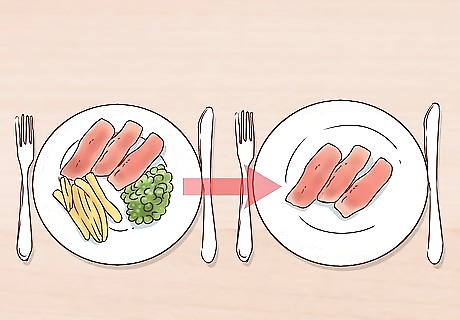
Prepare your body to fast gradually. If you've never fasted before, it’s difficult to predict how your body will respond. Start small instead of cutting out food altogether for an extended period. You'll have a better chance at safely sticking with a fast if you ease yourself into it. You might want to start by gradually phasing out a few foods or reducing your calorie consumption for 1 day. For example, try cutting added sugars from your diet for a week, or eat 50% fewer calories for 1 day. EXPERT TIP Shira Tsvi Shira Tsvi Personal Trainer & Fitness Instructor Shira Tsvi is a Personal Trainer and Fitness Instructor with over 7 years of personal training experience and over 2 years leading a group training department. Shira is certified by the National College of Exercise Professionals and the Orde Wingate Institute for Physical Education and Sports in Israel. Her practice is based in the San Francisco Bay Area. Shira Tsvi Shira Tsvi Personal Trainer & Fitness Instructor Expert Trick: A simple way to start eating less is to cut each meal you would normally eat throughout the day in half. Then, if you feel able, you can make these portions smaller, too.

Ready your kitchen for fasting. Whether you’re fasting to lose weight, to build discipline, or for religious purposes, do your best to rid your kitchen of temptations. If you leave tempting foods and drinks lying around the house, fasting will be a much harder experience. Avoid purchasing prohibited items before your fast, and give any on hand to friends or family. Keep in mind you should still have food in your fridge and pantry. If you’re observing Ramadan, for example, make sure you have fruits, vegetables, whole grains, and healthy protein sources for iftar and suhoor. If you’re Christian and gave up candy and chocolate for Lent, don’t leave these items sitting out on the counter. Give any on hand away or and do your best to keep the items you’ve given up out of sight and out of mind.
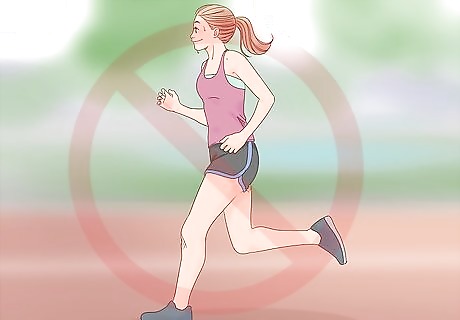
Avoid doing high-energy activities during your fast. Make adjustments during your fast, and try not to overexert yourself. Since you’re not taking in an ordinary amount of nutrients and calories, demanding activities could lead to weakness, dizziness, or fainting. Absolute fasting might not be wise if your occupation involves hard labor or if demanding activities are otherwise unavoidable.

Distract yourself if you feel tempted to cheat. Daydreaming about feasts will only increase your cravings, so do your best to get tempting foods and drinks off of your mind. If you feel tempted to indulge, tell yourself, “Stop. I can control my thoughts, and I’m committed to this fast.” Try doing a light activity, such as playing a game, listening to music, gardening, or writing. Spending time with a friend or relative might be a good distraction, as long as they know you’re fasting. You wouldn’t want them to suggest going out to dinner or grabbing ice cream cones. Avoid watching TV, since the commercials may tempt you with images of food and people eating. There might be a lot of food-related posts on social media, too. Try reading a book or working on a craft project instead. Keep in mind you should listen to your body if it’s telling you something’s wrong. Try to recognize the difference between feeling tempted to indulge and needing to eat because you’re feeling sick.

Try fasting with friends, relatives, or coworkers. A sense of community might help motivate you to stick with your plan. See if a friend, relative, roommate, your partner, or a colleague will take on the fast with you. You can hold each other accountable and give each other pep talks when temptations arise. If you’re fasting for spiritual purposes, your faith community can help you stay on track.
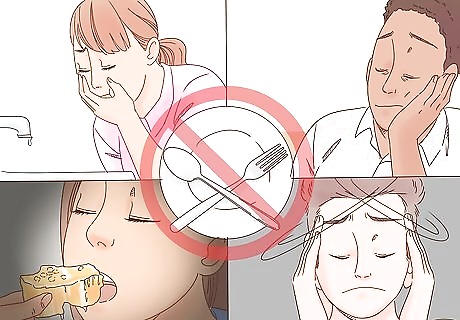
Stop fasting if you feel ill. Red flags include weakness, dizziness, confusion, tunnel vision, fainting, and nausea or vomiting. If you experience any concerning symptoms during a fast, drink water and eat a small meal. Your body might have a hard time handling heavy foods, especially if you’re nauseous, so go for crackers, toast, or soup. If you don’t feel better 1 to 2 hours after having a light meal, call your doctor. These symptoms might be signs of a medical emergency if you’re fasting and have a medical condition such diabetes or kidney disease, or if you take heart or blood pressure medication.
Following an Intermittent Fasting Diet
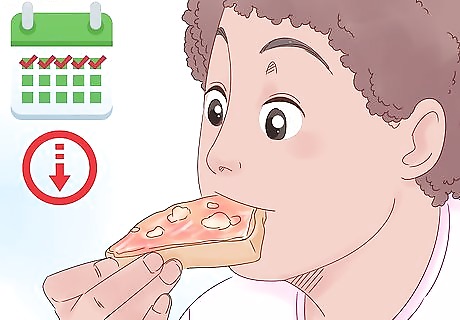
Restrict your calorie intake 5 days per month for an easier plan. If going without food altogether seems unsafe or undesirable, try a less intense diet. For 5 consecutive days each month, try to eat 1/3 to 1/2 as many calories as you normally would. If you’re used to eating 3,000 calories per day, go for 1,000 to 1,500. Aside from the 5 diet days, eat a normal, healthy diet. Don’t pack on lots of sweets and fatty foods during non-fasting periods. You could also try restricting your caloric intake for 4 consecutive days, then resuming your normal diet for 10 consecutive days. There’s evidence that caloric restriction mimics the beneficial effects of strict fasting without the potentially harmful health risks.

Try the 16:8 daily fasting diet for weight loss. For a daily fasting diet, try eating solid foods only during 8-hour intervals, such as between 10 a.m. and 6 p.m. Outside of those hours, limit your consumption to water, caffeine-free tea, and other non-caffeinated, non-alcoholic, and calorie-free beverages. Intermittent daily fasting may help promote weight loss. Since you’re still meeting your daily nutritional needs, there’s a lower risk of adverse effects. Remember to avoid binge eating during your 8-hour window. Eat a normal, balanced diet of fruits, veggies, lean proteins (such as white skinless poultry or fish), and whole grains.
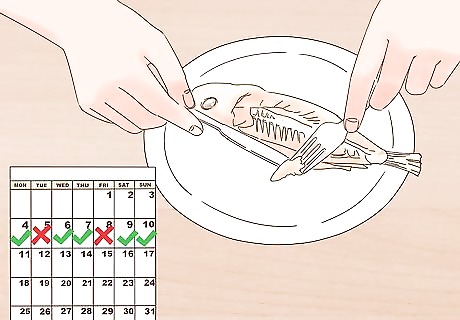
Fast for 2 non-consecutive days per week to follow the 5:2 diet. The 5:2 fasting diet involves eating normally for 5 days of the week, and restricting your calories for 2 days. For instance, you might fast or eat fewer calories on Tuesdays and Fridays. On fasting days, diet plans recommend consuming 500 calories if you’re a woman and 600 if you’re a man. However, medical professionals argue that these are arbitrary numbers. Since there’s no scientific evidence that backs an optimal number of calories to consume on a fasting day, try experimenting and see what works for you. If consuming 500 to 600 calories per day doesn’t feel right, try to eat 1/3 or 1/2 of the amount you normally would.

Be wary of cleanses and detox diets. Sticking to a liquid diet for an extended period of time could be dangerous. Additionally, some crash diets advise drinking unpasteurized beverages and other products that might make you sick. Be suspicious of diet plans that promise to detoxify your system. Your body detoxifies itself using your kidneys, liver, and other organs. To help your body detoxify itself, drink plenty of water, eat fiber-rich foods (such as nuts, grains, and raw fruits and veggies), and consume naturally fermented foods (such as yogurt, kimchi, and sauerkraut).
Fasting for Spiritual Purposes

Learn about the role fasting plays in your religious tradition. Even if you’re well-versed in your faith’s practices, it’s helpful to review the purpose of fasting in your religion. In most religions, fasting is meant to foster moderation, discipline, and devotion. You could read religious texts, ask leaders at your place of worship, or talk to friends and relatives who practice your faith. Getting beyond the literal sense of fasting and reflecting on its moral and spiritual significance could help bolster your resolve.

Avoid boasting or complaining about your fast. Fasting isn’t about bragging to other people about how holy you are or how long you’ve gone without eating. You shouldn’t tell others about how difficult it is or complain about your struggle, either. Instead, focus on using the experience to enhance your faith. Remember, it’s not about what other people think of you. The point is to cultivate virtue and honor the tenets of your religious tradition.

Stop for a moment of prayer when you feel hunger pangs. When you feel tempted or hungry, stop and say a prayer to get your mind off of things. Close your eyes, and reflect on the fact that you’re doing this for a higher purpose. While prayer might help you stay motivated, remember that there’s a difference between being tempted to indulge and being sick. If you experience dizziness, confusion, tunnel vision, fainting, or other concerning symptoms, it’s best to eat something.

Eat well-balanced permitted meals slowly. In observance of Ramadan, followers of Islam fast during the day for about a month. Fasting for this length of time can be demanding on the body, so it’s important to make the most of iftar and suhoor, or the permitted meals after sunset and before sunrise. While permitted meals shouldn’t be indulgent, you should still try to eat a mix of fruits, veggies, grains, and low-fat proteins. Fortunately, from Northern Africa to the Indian subcontinent, meals traditionally served at iftar often include combinations of rice, veggies, dates, meats, fruit juices, and milks. Try to eat permitted meals slowly, and avoid rich, fatty foods. After fasting all day, gulping down a heavy meal quickly could make you sick. Regardless of your faith, any permitted meals during extended periods of fasting should be healthy and well-balanced, and you should pace yourself when you eat.


















Comments
0 comment